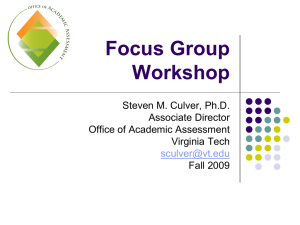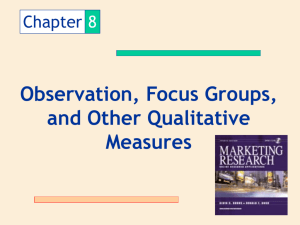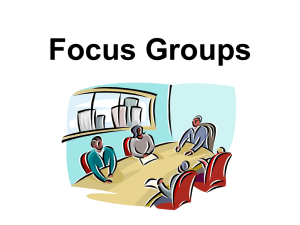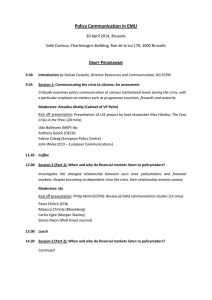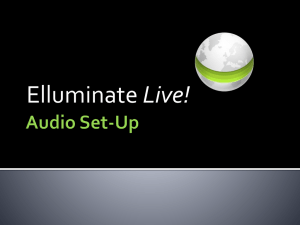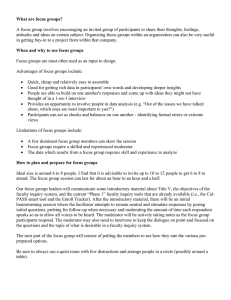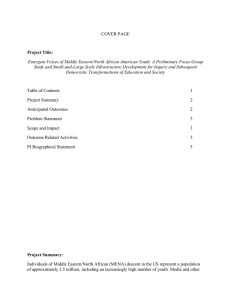Focus Groups from Start to Finish Morris Endowed Chair
advertisement
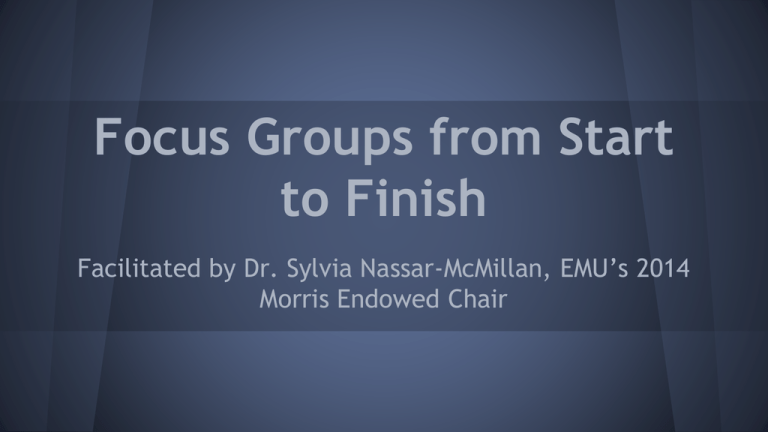
Focus Groups from Start to Finish Facilitated by Dr. Sylvia Nassar-McMillan, EMU’s 2014 Morris Endowed Chair Objectives ● Review the use of Focus Groups in survey item development ● Overview of the key steps in effective use of Focus Groups ● Practice a Focus Group mock session Research Opportunity Training attendees will have the opportunity to participate in Focus Group facilitation and coding as part of a regional study of high school and college students self-identified as youth of Middle Eastern/North African (MENA) descent ● please see us after the training if you are interested Researcher’s Background ● Dissertation Research ● National Science Foundation (NSF) ● NASA Current Project Overview Individuals of Middle Eastern/North African (MENA) descent in the US represent a population of approximately 3.5 million, including an increasingly high number of youth. Media and other mainstream resources chronicle population-relevant sociopolitical events in domestic as well as global contexts. In a post-9-11 era this includes lingering perspectives on the actual 9-11 tragedy as well as more current world events such as the Arab Spring. Taken together, MENA youth of today face a myriad of unique adversities such as stereotyping and profiling, often leading to microaggressions and other harmful acts of discrimination. Empirically based, culturally competent practices are needed in order to foster the resilience of this population and, in turn, to empower these youth to navigate effective identity development processes. Project Outcomes The proposed project represents a 10 month initiative that will develop… ● A protocol and corresponding training for interdisciplinary EMU faculty and students to conduct focus groups in southeast Michigan area educational institutions; ● Develop interdisciplinary research networks of MENA scholars in the Southeast Michigan/Windsor area; ● Provide opportunities for high school and college students to participate in focus groups exploring issues relevant to their identity development; ● Finalize a pilot survey instrument for wide-scale (i.e., international) dissemination, identify a national and international networks of MENA scholars and prospective Developing Survey Items 1. Item Generation a. b. Use recent professional literature Feedback from people in the field i. Focus Groups 2. Item Refinement a. Focus Groups Focus Group Definition “Focus groups involve the explicit use of group interaction to produce data and insights that would be less accessible without the interaction found in a group.” ● Nassar-McMillan & Borders, 2002 ● Morgan, 1988 Advantages of Focus Groups ● Similar to group vs. individual counseling ● More information gathered in shorter amount of time ● Group work leads to creativity, which allows for a larger range of ideas etc. ● Researcher can observe group interactions Uses of Focus Groups ● Exploratory o Refine information about a previous topic o Elicit new insight and information from another angle ● Research Process o o o o o Gathering information Developing hypotheses Stimulating new ideas/concepts Creating appropriate terminology Interpreting results Uses of Focus Groups Continued ● Supplement quantitative or other qualitative techniques OR be self-contained techniques by themselves ● Individual focus groups OR a series of focus groups for comparative uses ● Focus Groups can be adapted to meet various needs Step 1: Generate Items ● Gathered from related instruments ● Key terms etc. operationalized ● Task of Focus Group o o o Adapt items to use appropriate terminology Generate new items Indirectly pre-test rough version of instrument Step 2: Identify Respondents ● Need a reasonable sample size ● Traditionally Focus Groups are conducted locally due to practicality & necessity - therefore not a random sample ● Should reflect population of interest, but still remain varied as much as possible ● Use of current technology = online Focus Groups Step 3: Identify Moderator/Facilitator ● Is the primary investigator too invested to be objective? ● Number of Moderators needed o determined by the total number of groups & group members Moderator’s Main Role ● ● ● ● Staying on task during Focus Group session Help group members articulate their perspectives Time management Determine whether to probe into deeper issues, skip items that have already been discussed or allow new items to emerge o When probing, don’t encourage group members to talk about topics they don’t want to Step 4: Generating & Selecting Interview Guide ● Determine level of structure for the Focus Group o o Structured vs. Unstructured Based on ultimate research goals ● Select topics & questions accordingly o ex: through discussions with key stakeholders, professionals etc. Step 5: Recruit Sample ● Determine how to construct the sample o Intergroup homogeneity vs. heterogeneity o Intragroup homogeneity vs. heterogeneity ● Determine the total number of groups o At least 2-3 ● Solicitation of group members o Active/Direct (i.e. phone calls, personal invitations) o Passive/ Indirect (i.e. flyers, social media, word of mouth) Step 6: Logistics ● Where will the Focus Groups be held? o Convenience driven ● When will the Focus Groups be held? ● How long will the Focus Groups last? o o average = 1.5hrs maximum = 2hrs Step 7: Ethical Guidelines ● Moderator provides purpose of groups ● Moderator gathers informed consent from each group member o o to participate in the research to be audio/videotaped Step 8: Build Rapport ● Moderator tries to facilitate early rapport building by utilizing introductions etc. ● This will help discussion build more quickly Step 9: Group Agenda ● The nature of the questions will determine how structured or task oriented it needs to be ● Utilize a notetaker ● Be cautious in using dichotomous questions ● Taping allows notes to be confirms & further qualitative analysis Step 10: Group Discussion ● Characteristic of Focus Groups to readily engage ● This is the part that will facilitate the greatest refinement of items and generation of new items Step 11: Using the Information ● How will the information gained during the Focus Groups should or will be used? ● Were all requirements met or do additional efforts need to be made? o For example: follow up surveys Step 12: Reporting Outcomes ● What has been accomplished ● Did the Focus Groups provide information sufficient enough to continue with research? ● What form will the report take? o Narrative, Revised Instrument, etc. Focus Group Limitations ● Lack of Generalizability o o Small number of participants No use of random assignment ● Interdependent/Biased Responses o Moderator must try to ensure that no one group member dominates the discussion ● Self-Report Examples ● https://www.youtube.com/watch?v=Auf9pkuCc8k ● https://www.youtube.com/watch?v=0gR1zu7i0-E ● https://www.youtube.com/watch?v=RrKqVF2qMA0 Time to Practice References Kamberelis, G. & Dimitriadis, G. (2013). Focus groups: From structured interviews to collective conversations. Florence, KY: Routledge Denzin, N.K & Lincoln, Y.S. (Eds.). (2011) The Sage handbook of qualitative research. Thousand Oaks, CA: Sage Heppner, P. P., Wampold, B. E., Kivlighan, Jr., D. M. (2008). Research design in counseling (3rd ed.). Belmont, CA: Brooks/Cole Nassar-McMillan, S.C. & Borders, L.D. (2002). Use of focus groups in survey item development. The Qualitative Report, 7 (1). Nassar-McMillan, S.C., Wyer, M., Oliver-Hoyo, M., & Ryder-Burge, A. (2010). Using focus groups in preliminary instrument development: Expected and unexpected lessons learned. The Qualitative Report, 15(6), 1621-1634. Contact Info Aisha Al-Qimlass mialqiml@ncsu.edu Johnnetta Ricks jricks@emich.edu
